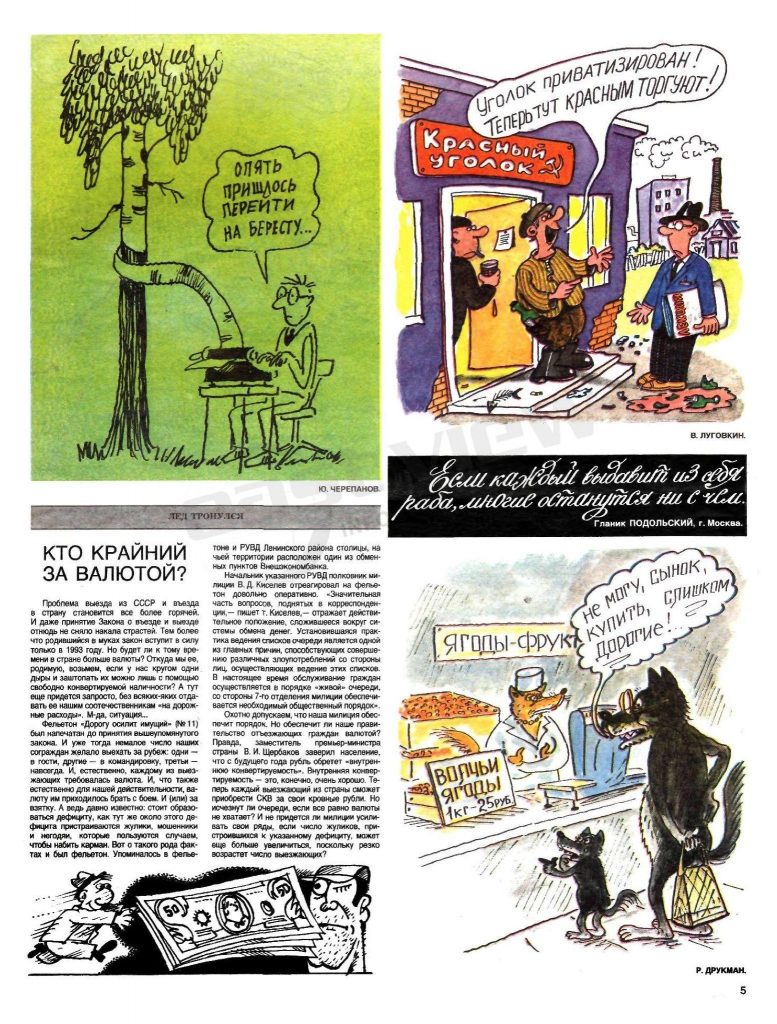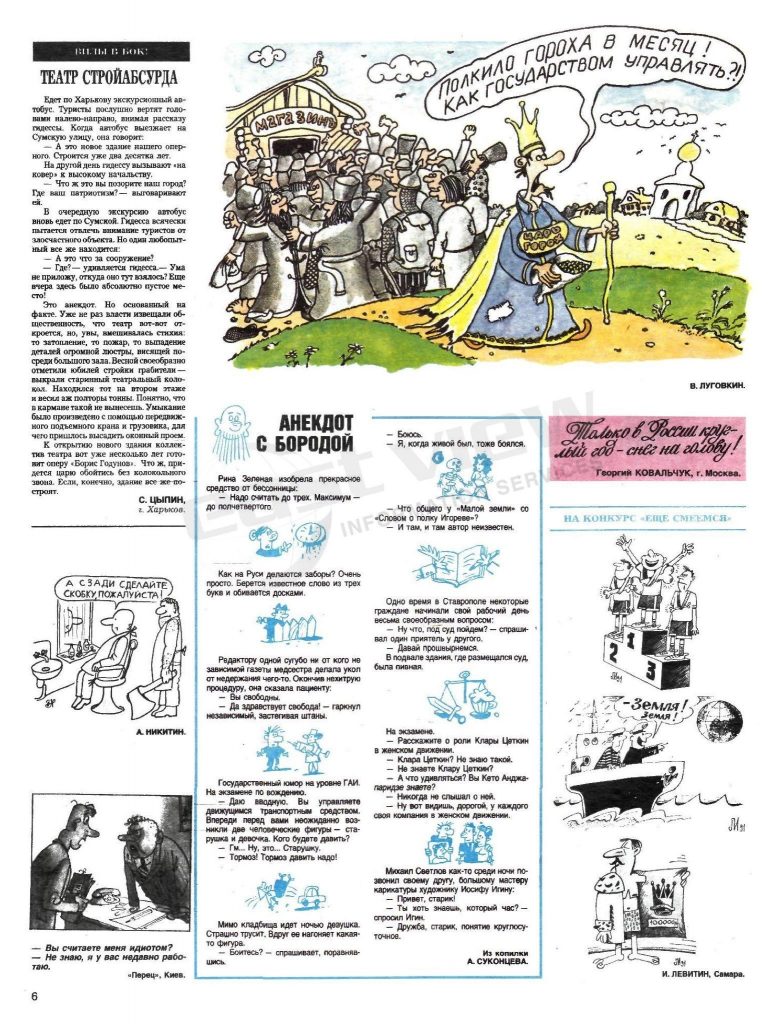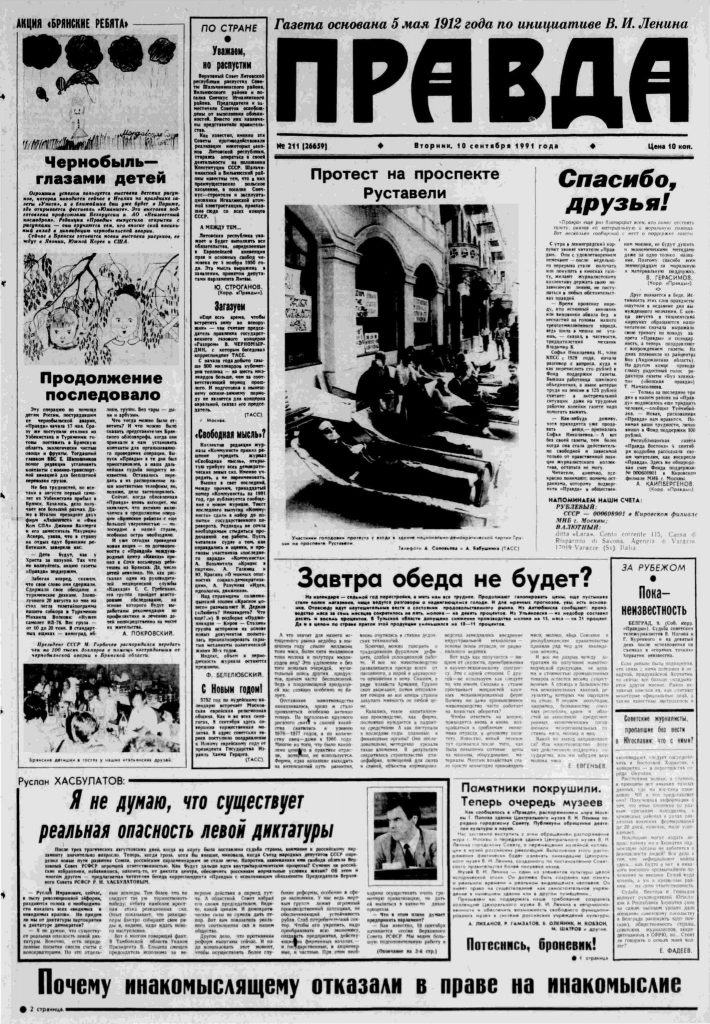By: Natasha Netzorg
After the dust had settled from the August Coup, Soviet media outlets began to address the events, offer diagnoses on what had just happened, and plausible treatments for a multitude of problems. Opinions ranged, although almost most suggested strong medicine. Reporters placed a strong emphasis on the economy, particularly food shortages. One of the larger editorials in this vein came from the weekly paper, Moscow News, which strongly criticized the actors involved in the August events. The September 1 piece “Yesterday We Defended Ourselves, Today it’s Time to Think” broke down each of the actors involved in the putsch and took a hard stance on how to deal with them.
The newspaper’s board of directors place a great deal of blame on the Communist Party of the Soviet Union (CPSU), which suspended all non-party papers during the three-day coup. The Moscow News and Pravda were unable to publish on grounds that they needed to be nationalized. The board in turn demands the suspension of the CPSU’s printing facilities until their guilt can be determined.
USSR President Mikhail Gorbachev’s policies are scrutinized with the authors claiming that his “seedy politics” and evasive actions allowed the Group of Eight to attempt the coup in a similar political manner. Gorbachev’s policies emphasized the monopolization of the economy and the “national-state structure” as well as “hypercentralism,” which proved to be stepping stones to the events in August. With a louder demand for reformation, Gorbachev’s acknowledgement of the “socialist choice” was an affirmation of the stifling of the people rather than an address of the need for reorganization to “safeguard against the return of totalitarianism.” The board of directors also make a heavy push for the signing of the Union Treaty as a means to slow, if not stop, the “free fall” amid growing fears of the possibility of a military coup. Overall, they call for a real build-up of democracy and a common moral ground of the people to avoid another coup in the future.
The CPSU Central Committee building was subsequently sealed off, the hardline newspapers closed, and the Monument to Felix Dzerzhinsky (the head of the Cheka, the first Soviet secret police force) was demolished. These were small but substantial victories, bringing Soviet Russia closer to the democratic build-up The Moscow News called for. The article concluded: “The road to democracy is hard. This is only the beginning of the road.”
While many called for the CPSU’s ban, others suggested different paths. Roy Medvedev, the well-known historian who had been expelled from the Communist Party in 1969 for his severe criticism of Stalin in his book Let History Judge, spoke out against the decision to suspend the CPSU at the Congress of People’s Deputies of the USSR. In the September 4 edition of Pravda, Medvedev’s article “The CPSU Cannot Become a Specter” condemns the CPSU as “criminal and totalitarian” but maintains that the suspension and possible elimination of the CPSU are arbitrary and illegal. Medvedev maintains that the “CPSU cannot disappear from the political arena.”
Soviet papers did not just dissect the political crisis. Many articles also highlighted the ongoing food shortages within the USSR. On September 10 a front page Pravda article asked, “Will there be dinner tomorrow?” Another Pravda article detailed the preparations for the coming winter, including how vehicles, labor, and if needed, military units were expected to be sent out for harvesting, cleaning, and transporting. A cartoon accompanying the article perfectly captures the mood: it features a headless man leading a line of others across a thin branch, humorously depicting officials and their inability to handle the situation.
The severity of the agricultural decline in the USSR is also emphasized throughout the satirical journal, Krokodil. Small features throughout the September issue emphasize the economic struggles, including one cartoon of a wolf unable to purchase “wolf-berries” for their son, stating it’s too expensive. Another features the “tsar of peas” leaving the market, wondering how to run a state when he’s only given a pound of peas a month.
With the socio-economic and political issues continuing in the wake of the August coup, protests also take place. The coup is in the past, Soviet people continue to live in the present, but the future remains as murky as ever.
Natasha Netzorg is a junior majoring in Russian, East European, and Eurasian Studies.
Works Cited:
(1991, September 1). Page 1. Moscow News Digital Archive. Retrieved from https://dlib.eastview.com/browse/doc/49797009
(1991, September 4). Page 2. Pravda. Retrieved from https://dlib.eastview.com/browse/doc/21571029
(1991, September 10). Page 1. Pravda. Retrieved from https://dlib.eastview.com/browse/doc/21572452
A. S. P’IANOV. (1991). Krokodil #26. Izdatel’stvo Pravda. Retrieved from https://dlib.eastview.com/browse/book/66971





